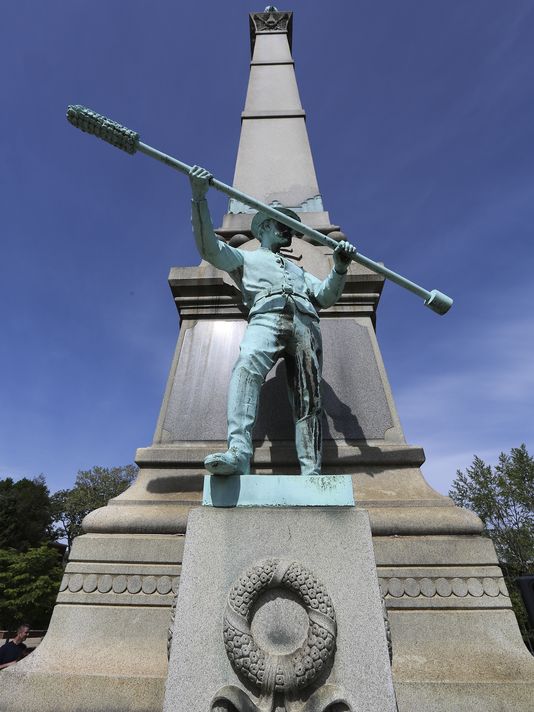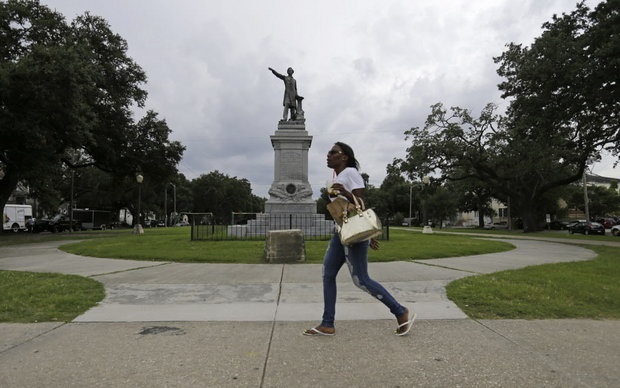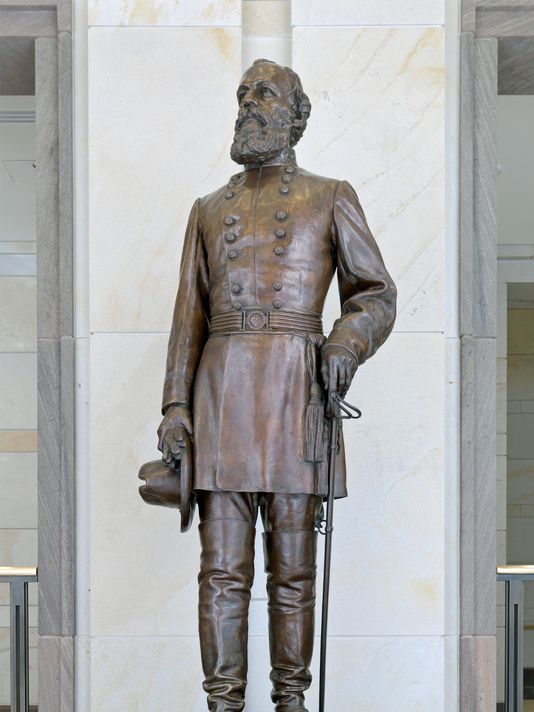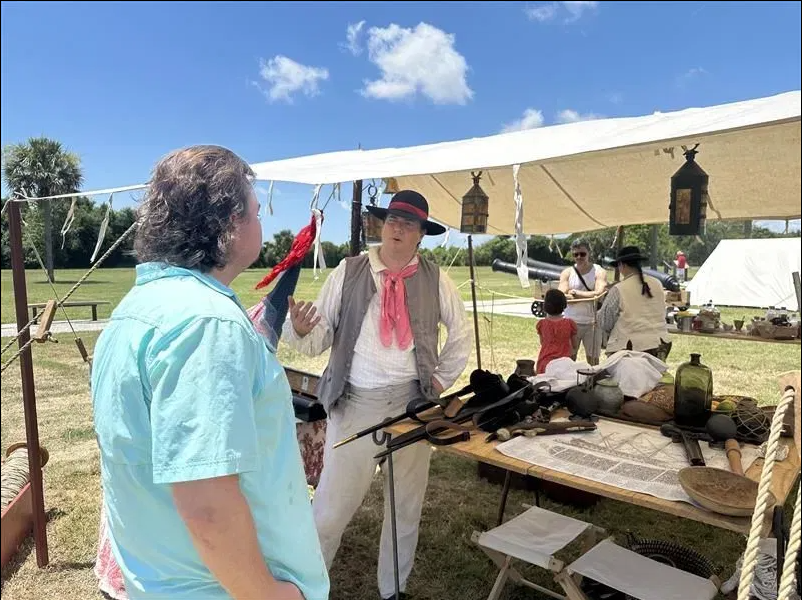KENTUCKY: Confederate Statue Lawyers to Drop Client
In the wake of a Jefferson County judge’s decision to lift a restraining order against the planned relocation of Louisville’s controversial Confederate monument, attorneys for the plaintiffs want to be relieved from representing one of their clients who they said made a racial social media post after the ruling.

The Confederate monument on S. Third Street at the University of Louisville. Mayor Greg Fischer and UofL President James Ramsey had a press conference on Friday morning announcing that the monument will be removed immediately. April 29, 2016
(Photo: By Michael Clevenger, The C-J)
Attorneys Thomas McAdam and J. Andrew White said in a legal document that they intend to make a motion Monday before Judge Judith McDonald-Burkman to be relieved from representing Everett Corley – a recently-defeated Republican Congressional candidate who joined the Sons of Confederate Veterans in the lawsuit that sought to halt the monument’s removal.
The lawyers cited a post on his social media account after the May 25 hearing.
In a Facebook post, Corley called African-American University of Louisville professor Ricky Jones “a damn dirty black bastard,” according to a May 27 article in Insider Louisville. The post has since been deleted, but was widely viewed.
Jones, chair of the department of Pan-African Studies, has been a key advocate forremoving the 121-year-old monument, located in a median on Third Street amid the University of Louisville campus.
“Counsel for the Plaintiff did not enter this case to pursue a racial agenda and cannot represent a Plaintiff who has chosen to inject race or bigotry into the issues of this matter and ask to be relieved as counsel for Mr. Corley due to these offensive and unwise remarks,” the legal filing said, calling it a “raciest (racist) post.”
Corley, whose Facebook account recently still had a post calling Jones “the black Rasputin,” said Sunday that the post was an “inexcusable” mistake made in the heat of a stinging loss, and said he respects the attorneys’ decision. He acknowledged that had likely hurt the case, which supporters said was about history and not race.
Other plaintiffs, including Kentucky’s Sons of Confederate Veterans and activist Ed Springston, are still awaiting a written decision after McDonald-Burkman verbally dissolved a restraining order they’d won last month and denied the injunction they’d sought.
Attorneys for the city agreed in court to do no work until written findings were issued over arguments about whether Louisville Mayor Greg Fischer had the right to move the monument and whether any historical preservation rules were violated.
On Wednesday, a Louisville Forum panel will take up the question of whether the monument should stay or go.
–courierjournal.com
###
ALABAMA: State Offices Closed for Jefferson Davis’ Birthday
MONTGOMERY, Al. — Alabama’s state offices are closed Monday (June 6) in honor of Jefferson Davis’ birthday, according to AL.com. Davis was the president of the Confederate States of America.

In this Sept. 2, 2015, photo, a woman walks past a monument of Jefferson Davis on Jefferson Davis Parkway at Canal Street in New Orleans. (AP Photo/Gerald Herbert) (Gerald Herbert)
Along with state offices, state courtrooms and driver’s licenses offices are closed in Alabama. However, AL.com says U.S. Post Office locations and bank branches are open.
Alabama is the last state to have a legal holiday solely to commemorate the birthday of Davis, according to AL.com. Alabama has three separate holidays set aside to honor Confederate leaders: Robert E. Lee’s birthday, which is marked in January on the same day as Martin Luther King Day; Confederate Memorial Day in April; and Davis’ birthday in June.
–al.com
###
FLORIDA: What if Gen. Kirby’s Former Slave Replaced His Statue?
History can be a mystery. Sometimes a picture just doesn’t look right when viewing past events through a modern lens. Such is the relationship of two St. Augustine men, Edmund Kirby-Smith and Alexander Darnes.
Kirby-Smith is about to be kicked into the dustbin of history. Darnes is a largely forgotten man. Kirby-Smith was Supreme Commander of the Confederate forces west of the Mississippi. His statue has represented the state of Florida for nearly 100 years in the U.S. Capitol’s National Statuary Hall. A lot has happened since he and John Gorrie were picked to be the Floridians in a hall of distinguished citizens. This year, the Legislature decided Kirby-Smith’s time was up.

The last Confederate General has represented Florida in the National Statuary Hall for nearly 100 years. The legislature voted this year to remove this statue of Edmund Kirby-Smith
(Photo: The U.S. Capitol’s National Statuary Hall)
The state is accepting nominations to replace the general until Friday.
What if Kirby-Smith’s replacement was his former personal slave, Alex Darnes, M.D.?
“Well, that would be an interesting suggestion,” said Maria Kirby-Smith, the great-granddaughter of the general, who was her father’s grandfather. “Alex Darnes was respected and liked by both communities. His funeral was the largest attended in the history of Jacksonville (1894).”
Kirby-Smith was the last Confederate general to surrender, bringing the Civil War to a close. Darnes was with him to the end, handling the general’s personal papers and serving as a valet.
“He always trusted me with full confidence in every respect,” Darnes wrote after Kirby-Smith’s death.
When the general escaped to Cuba to avoid being tried for treason, Darnes took his mother and wife to Pennsylvania and helped clear the way for his legal return. Kirby-Smith became a math professor at Sewanee University in Tennessee. Darnes went on to graduate from Lincoln University – where he was one of the winning defendants in a Chester, Pennsylvania, voter suppression case. After earning a medical degree from Howard University, he returned to Florida to become Jacksonville’s first licensed black doctor.
He distinguished himself during small pox and yellow fever epidemics. On his rounds, he met a 10-year-old James Weldon Johnson.
“He had a hard uphill fight,” Johnson recalled in his autobiography about Darnes’ arrival in 1881 Jacksonville. “Few were the colored people at the time who had the faith to believe that one of their own knew how to make those . . . marks on a piece of paper that would bring from the drugstore something to stand between them and death.”
There is no record Darnes and Kirby-Smith were ever together again after Kirby-Smith fled Texas. But they wrote each other frequently.
“The family were prolific letter writers. The general’s papers are well-preserved in the University of North Carolina archives,” said Charles Tingley, a librarian and researcher at the St. Augustine Historical Society.
He said the letters reveal an obvious affection between the two. At times, Darnes comes across like a nephew corresponding with a favorite uncle.
Tingley recently published a 44-page article about Darnes, “Another Invisible Man,” in the Florida Historical Quarterly. He first stumbled across Darnes nearly 15 years ago when the Kirby-Smith family asked that a statue imagining a reunion of the two men greeting each other late in life be placed on the Historical Society’s grounds.
The statue was created by Maria Kirby-Smith, a South Carolina sculptor. She suspects that Alex Darnes is a blood relative — maybe the general’s half-brother, maybe a nephew. She had one picture of Alex Darnes from which to work when she created her piece.
“I had never seen that photograph; it was a revelation,” recalled Kirby-Smith. “You see a face slowly materializing on the computer screen and realize that you see familiar geography in the face. The center of the cheekbones, the jawline, there are very strong physical similarities.”
Both Kirby-Smith and Tingley think Darnes is an extraordinary story about the Civil War and the human spirit. When thinking of appropriate Floridians for a national hall of prominent citizens, Tingley said there are many 20th century Floridians who have distinguished themselves at the national level. He mentions Henry Flagler, A. Philip Randolph and Mary McCloud Bethune, among others.
“It’s a fascinating case study, but Alex Darnes doesn’t quite meet the national significance bar,” said Tingley.
But when it’s suggested that Darnes and Kirby-Smith speak to the complexities of race relations and understanding the Civil War, Tingley relents – a little.
“I suppose you are right, there,” said Tingley. “Back in the 1920s (when the Kirby-Smith statue went up) there weren’t many distinguished Floridians . . . but A. Philip Randolph going from Crestview to a national labor leader and organizing the March on Washington, that’s pretty nationally significant.”
The Secretary of State’s office is conducting an online survey until June 10 for Floridians to submit names to replace the Kirby-Smith statue. Nominees can also be sent to the Division of Historical Resources, 500 S. Bronough St. Tallahassee, FL 32399.
“What I’m hearing is people of color are forming a consensus around Mary McCloud Bethune because she is a great Floridian recognized for the work she did with FDR,” said Dale Landry, president of the Tallahassee NAACP branch.
The survey results will be considered by an ad hoc committee on June 22. The committee will recommend three names from which the Legislature will choose a replacement.
Kirby-Smith, the sculptor, said she received some criticism for the statue she created for the historical society. She views their correspondence as a meeting of the spirits, which she tried to capture in art. The piece depicts a reunion, Kirby-Smith in academic garb, Darnes with a medical bag, both men with outreach arms approaching the other.
She was accused of being a revisionist and a Pollyanna, one who ignores the bad — a stinging indictment for an artist.
“(It’s) Two extraordinary gentlemen who had come through extraordinary circumstances, a lot of it not very good. It is a triumph and tribute to the power of the human spirit,” said Kirby-Smith. “So, I’m willing to be called a Pollyanna. If we don’t stay on the side of the positive we’ll never find the light and keep on a good path.
Like many, Alex Darnes was armed with only a degree and a dream when he came to a place called Florida. He went to work, built a career, a community and a pathway for others to follow.
Wouldn’t it be something if a former slave replaces the last Confederate general as a Florida representative in the U.S. Capitol’s National Statuary Hall?
–talahassee.com
###


